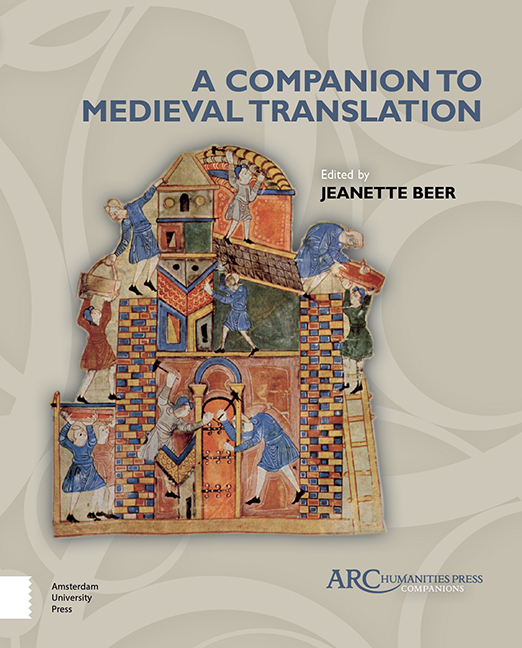Book contents
- Frontmatter
- Contents
- Acknowledgements
- Introduction
- Chapter 1 The European Psalms in Translation
- Chapter 2 The Old French Bible
- Chapter 3 Middle English Religious Translation
- Chapter 4 Bible Translation and Controversy in Late Medieval England
- Chapter 5 Medieval Convent Drama: Translating Scripture and Transforming the Liturgy
- Chapter 6 Translating Romance in Medieval Norway: Marie de France and Strengleikar
- Chapter 7 Christine de Pizan, Translator and Translation Critic
- Chapter 8 Translation, Authority, and the Valorization of the Vernacular
- Chapter 9 Vernacular Translation in Medieval Italy: volgarizzamento
- Chapter 10 Dante and Translation
- Chapter 11 Chaucer and Translation
- Chapter 12 Alchemy and Translation
- Chapter 13 Scientific Translation: A Modern Editor’s Perspectiv
- Chapter 14 Modern Theoretical Approaches to Medieval Translation
- Chapter 15 Observations on Translation by a Thirteenth-Century Maître: Li Fet des Romains
- Epilogue. Observations on Translation by the Oxford Professor of Poetry: Pearl
- General Bibliography
- Appendix
- Index
Chapter 11 - Chaucer and Translation
Published online by Cambridge University Press: 20 November 2020
- Frontmatter
- Contents
- Acknowledgements
- Introduction
- Chapter 1 The European Psalms in Translation
- Chapter 2 The Old French Bible
- Chapter 3 Middle English Religious Translation
- Chapter 4 Bible Translation and Controversy in Late Medieval England
- Chapter 5 Medieval Convent Drama: Translating Scripture and Transforming the Liturgy
- Chapter 6 Translating Romance in Medieval Norway: Marie de France and Strengleikar
- Chapter 7 Christine de Pizan, Translator and Translation Critic
- Chapter 8 Translation, Authority, and the Valorization of the Vernacular
- Chapter 9 Vernacular Translation in Medieval Italy: volgarizzamento
- Chapter 10 Dante and Translation
- Chapter 11 Chaucer and Translation
- Chapter 12 Alchemy and Translation
- Chapter 13 Scientific Translation: A Modern Editor’s Perspectiv
- Chapter 14 Modern Theoretical Approaches to Medieval Translation
- Chapter 15 Observations on Translation by a Thirteenth-Century Maître: Li Fet des Romains
- Epilogue. Observations on Translation by the Oxford Professor of Poetry: Pearl
- General Bibliography
- Appendix
- Index
Summary
Throughout his life, Chaucer was exposed to material written in languages other than English. He was probably introduced to works in Latin during his schooling (about which we can only make speculations, since no records pertaining to it survive), and it is clear that he extended his knowledge of material in Latin over the course of his lifetime. He is likely to have become familiar with courtly poetry in French, as well as other literature in the same language, when he served in the entourages of members of the English royal family, including the king’s: some of the men who composed such poetry, for example the Savoyard knight Oton de Granson, were attached to the courts of members of the English royal family likewise. Chaucer probably came to know further writings in French when he visited French-speaking territories on the European continent, as he did repeatedly during his adult life, often to conduct the king's business there. In the 1370s, two voyages that Chaucer made to Italy on behalf of the king (Edward III, then Richard II) brought him into contact with Italian literature— or more of this than Chaucer may have come to know through the dealings that he had with the Italian merchant community in London.
At various different points during his life, Chaucer translated into English works that he had read in other languages. Probably when he was still a young, or youngish, man, he translated Le Roman de la rose into English from French; one of the fragments of English translations of the work that survive to us— a fragment known as “Fragment A,” which contains an anglicized version of the first few hundred lines of the opening section of the poem by Guillaume de Lorris— is thought by most scholars to have been produced by Chaucer. Later in his life, probably in 1380, or a little later, Chaucer translated into English Boethius's De consolatione philosophiae, which had been written, in Latin, early in the sixth century, and translated into French by Jean de Meun, the continuator of Guillaume de Lorris's Le Roman de la rose, early in the fourteenth century (Chaucer translated from both the Latin and the French versions of the text, as will be discussed further below).
- Type
- Chapter
- Information
- Companion to Medieval Translation , pp. 133 - 142Publisher: Amsterdam University PressPrint publication year: 2019



